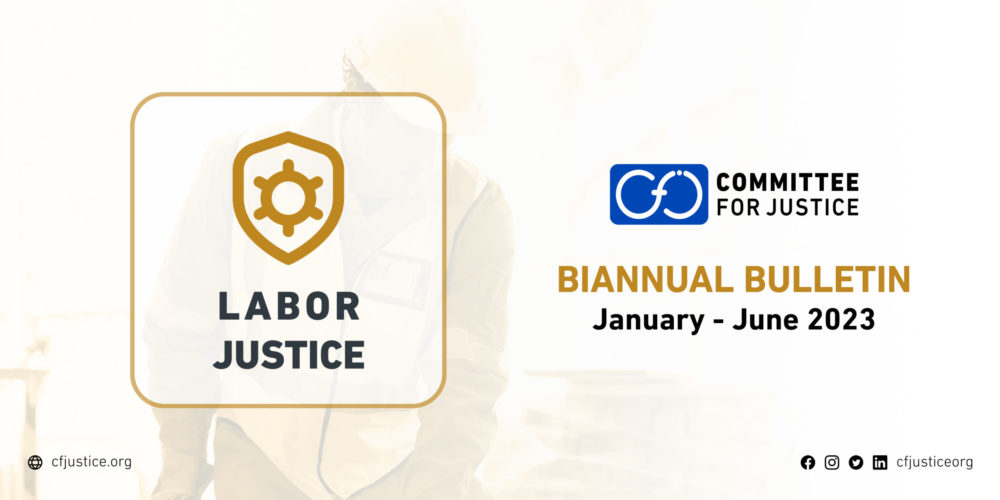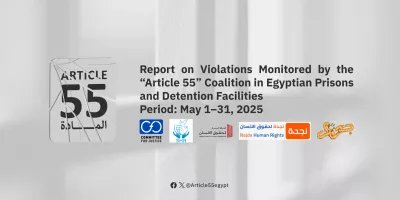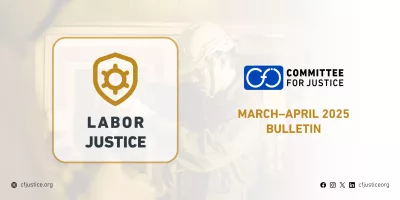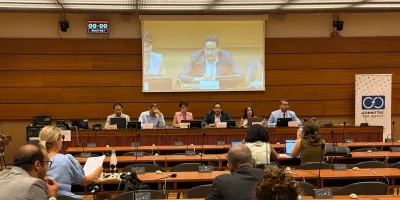The Committee for Justice (CFJ) has issued a biannual bulletin covering the months from January to June 2023, documenting the conditions of workers and the labor movement in Egypt. The bulletin sheds light on the economic crisis that reached its peak during this period, along with the inflation that reached record levels.
The committee explained in its bulletin that workers were among the most affected groups in these circumstances, especially with the employers’ reluctance in both the public and private sectors to compensate workers and employees for the effects of inflation. Some employers resorted to using security forces to disperse workers’ strikes and pursue them.
The bulletin addressed the labor protests that occurred during the first half of 2023 and the violations and threats directed at workers as punishment for their activities, whether from employers or security forces. It also highlighted the attack on workers’ right to freedom and independence in union organizing, as seen in the invasion of the Engineers Syndicate. Additionally, it emphasized the negligence of occupational safety rules, affecting the lives and safety of workers.
The bulletin covered protests in several companies, both governmental and private. For example, the strike of Mac carpet manufacturing workers, a subsidiary of Oriental Weavers, protesting against the low annual increase. Similarly, the strike of workers at the Textiles and Spinning Company in Samannoud, Gharbia, after the management decided to reduce the monthly allowance for workers from 300 to 150 Egyptian pounds.
In addition, more than 428 workers from Eco Egypt for Oil Production in Suez staged an open sit-in at the company’s headquarters, protesting the low salaries amid inflation. In April 2023, customer service employees at the Arab African Bank, subcontracted through an external company working with banks called Raya Company, went on strike due to the bank management’s refusal to increase their salaries in line with economic conditions.
The bulletin also highlighted the organized invasion and sabotage of the voting headquarters at the conference hall of the Engineers Syndicate in Nasr City, Cairo, on May 30th. This aimed to destroy the votes of engineers on the decision to withdraw confidence from the current syndicate head, Tarek El-Nabrawy. This occurred after the initial count indicated that the majority of votes were against withdrawing confidence from the independent syndicate head. Dozens of unknown individuals stormed the hall, deliberately smashing the ballot boxes and destroying their contents.
Eyewitnesses reported that security forces belonging to the police were present outside the hall but did not intervene to stop the attack. The current syndicate head, Tarek El-Nabrawy, accused those behind the attack of being “thugs from the Nation’s Future Party,” which supports the current regime. The incident revealed that these actions were carried out with the knowledge and support of the current regime against the independent syndicate head.
In February 2023, the management of Kiriazi Company deliberately jeopardized the lives and safety of workers as a punishment for their decision to strike and an attempt to reduce the number of strikers. They suspended the company’s transportation service, forcing workers to use public transportation to reach the company. Some workers were injured while crossing the fast highway leading to the company, causing strong anger and frustration among them.
A similar incident occurred at Egypt Cement Company in Qena, where an explosion took place in the factory’s mazut (fuel oil) tanker. The estimated quantity of fuel inside was around 350 tons, resulting in the death of a worker named Ayman Ramadan, a technician in the mechanical maintenance team, succumbing to his injuries.
This bulletin is part of the Labor Justice project, through which CFJ aims to raise local and international awareness about the state of workers’ rights in Egypt. The committee seeks to explore ways to achieve justice for workers by monitoring labor market violations in Egypt and highlighting the dynamics of local laws and policies affecting workers’ rights in line with international human rights principles and agreements.






